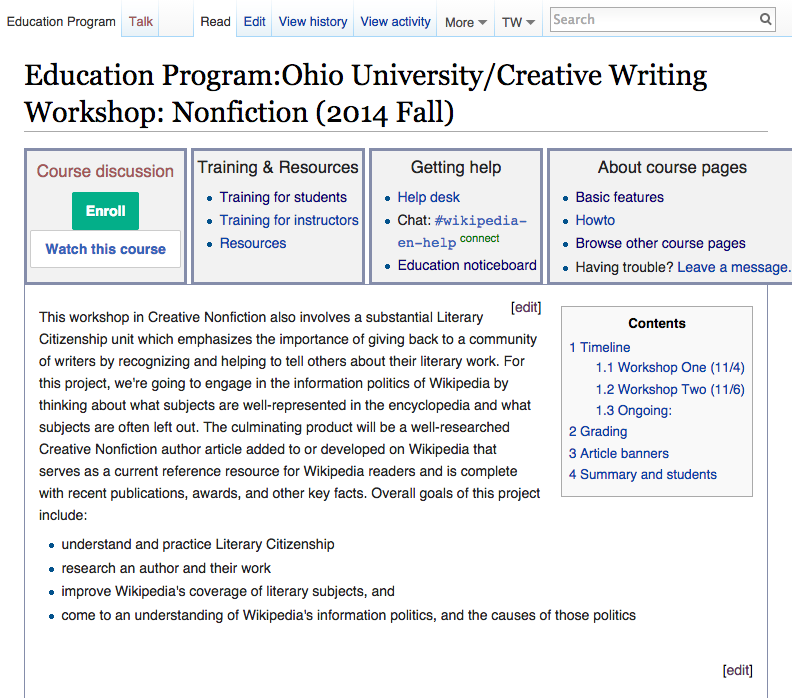I’m not completely sure how we got here so fast, but it’s November people, (which means I haven’t got nearly enough done on my dissertation) but which also means… Digital Writing Month! Or “DigiWriMo” if you prefer. To celebrate, this week’s Wiki Wednesday features a digital writing project happening right now at Ohio University, something I’m working on with a friend and colleague, the amazing and talented Sarah Einstein! Sarah’s teaching a creative nonfiction course this semester, and was kind enough to invite me to collaborate with her on a Wikipedia writing project. We spent the first few meetings arguing (good naturedly of course) about the goals, methods and implications of the project, but we managed to come up with a plan that allowed us to find common ground on all three of these issues, and, in the process, built a pretty amazing digital writing assignment that could be adapted for other courses as well.
The Plan
The basic idea is simple. In addition to workshopping their own writing, students in this course are also reading a lot of creative nonfiction, by some truly fabulous authors. As they read, they’re getting to know these authors and their work; they’re also learning from them, about nonfiction forms such as the essay, and about writing in general. Literary Citizenship, in this context, means that Sarah, as instructor, helps these students to seek out opportunities where they can give back to a community of writers by recognizing and helping to tell others about their literary work. There are certainly plenty of ways to be good literary citizens, but in this project, we’re trying something new: creating author pages in Wikipedia to help a broader audience access and learn about particular writers. In addition to learning about and practicing literary citizenship, students working on this assignment also get a chance to:
- research a literary author and become more familiar with their life and work
- improve Wikipedia’s coverage of literary subjects, and
- come to an understanding of Wikipedia’s information politics.
Information Politics
Wikipedia has become the web’s defacto reference source; it turns up frequently and is highly ranked in search engine results. In short, it’s a great place to build knowledge and to help expose and celebrate hard-working authors. But here’s another thing about Wikipedia. Literary culture, especially contemporary literary culture, isn’t always well-represented. In last week’s post, Heather talked about Wikipedia’s gender gap and some of the activist “re-write” projects that have taken on the task of broadening the encyclopedia’s coverage of marginalized issues and subjects. In some ways, this project is doing something very similar. Because Wikipedia’s editor base is so homogenous, there’s not always a great deal of attention paid to contemporary literary authors, especially, for example, if you compare that coverage with contemporary athletes. Engaging in Literary Citizenship in Wikipedia, then, beyond giving back to these individual authors, is also helping to diversify and expand Wikipedia’s coverage, creating an encyclopedia that represents a broader spectrum of culture. Awesome, right?
How We Did It
Students chose to focus on one creative nonfiction author from their course readings, and through research and interviews, wrote biographical article drafts (including things like recent publications, awards, and other key facts) of authors, drafts they would later transfer to Wikipedia.
Meanwhile, as a trained Campus Volunteer with the Wikipedia Education Program, an initiative designed to support college instructors integrating Wikipedia writing assignments into their courses, I helped Sarah design and set up a Course Page, a kind of central project management space, which would outline and support student projects, provide instructions, and keep a record of student work.
My partner-in-crime Sarah Einstein, photo by Dominik HenriciCourse pages come standard with all kinds of training and other resources, but for this project, which was designed to be less intensive so students could get back to their own creative writing, I designed a template for students to use to build their articles. I created the template by writing and publishing an author article for Sarah Einstein herself, who didn’t yet have a Wikipedia page, and then shared this article with the other students to use as a model for their own contributions.
Students copied the sample article to their Wikipedia user sandboxes, where they could experiment with the editor and save drafts without going completely public. Using the section headings and content as a guide, students drafted their articles, adding references and wikilinks as they moved through the text. As of this Wiki Wednesday, our students are about halfway through the process. They’ve got the basic article drafts in place in their sandboxes, but haven’t moved them to Wikipedia mainspace yet, which is set to happen later this week.
Watch It Happen
Want to follow our progress? Check out the course page. Students will be publishing their articles Thursday, November 6. Authors we’re working on in this project include: Jill Talbot, Wendy C. Ortiz, Marcia Aldrich, Benjamin J. Hollars, Karen Salyer McElmurray, Steven Church, Kathleen Fallon, Amy Monticello, and Laura Fraser. Thanks to these authors for participating in our project, the students working on their articles, and a special thank you to Sarah Einstein for inviting me to work with her. Look for a follow-up post in a few weeks that highlights students’ work in this project!


1 Comment
Pingback: Literary Citizenship in Wikipedia, Part 2 — Digital Rhetoric Collaborative